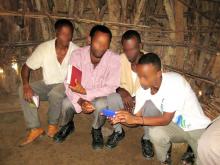The Beasts and Other Strange Creatures: Reading Apocalyptic Texts
Humans are curious creatures. We are eager to know the future. In fact, there is a branch of theology called “eschatology” which examines the doctrine of “last things.” Eschatology is better described as the direction and ultimate goal of God’s covenant faithfulness toward all of creation. In this sense, the story of Scripture is about the human condition and what God is doing about it.
There are a variety of ways in which Scripture foreshadows God’s ultimate purposes.







